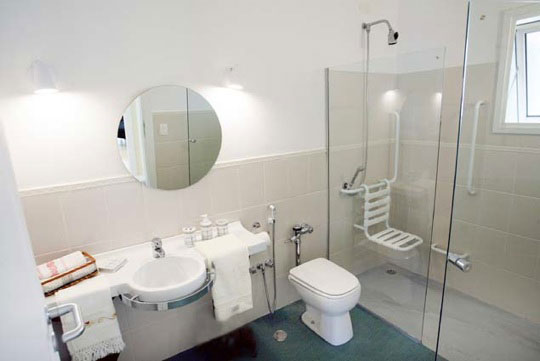
ALS Ice Bucket Challenge Progress


Living with ALS can make everyday tasks that once required little thought or effort a challenge. Basic hygiene tasks, including bathing, hair combing, tooth brushing, and related activities, performed in a bathroom often require added support for safety and comfort.
In the early stages of ALS, maintaining independence is paramount for most, particularly when it comes to bathing, dressing and using the toilet. Staying one step ahead of the changing needs that accompany an ALS journey may prolong independence and allow caregivers to easily step in with the right tools when needed.
Creating an ALS Accessible Bathroom Space
For example, consider making the bathroom more accessible by installing handrails next to the toilet and inside the shower stall to provide additional balance and support. A padded shower chair with skid-proof rubber supports can help reduce the risk of falling while supporting independence and to conserving energy (sitting versus standing). Installing a hand-held showerhead will add to the comfort of a seated shower. You may also consider remodeling your bathroom to include a roll-in shower for easy access throughout the progression of the disease.
Bathrooms can be slippery. Reducing moisture outside of the bathtub or shower can help prevent falls. If your bathroom does not have an exhaust fan, consider installing one. Line the bathtub or shower area with a non-slip mat. Add slip-prevention rugs or “self-stick” strips to main surface areas surrounding the sink and other common pathways.
Round all hard counter edges and soften corners to reduce the chances of injury in the event of a fall. The ALS Association’s Assistive Technology expert, Alisa Brownlee also offers this complete guide to avoiding falls in the home.
As ALS progresses further, bathing techniques will need to change, and more help from a caregiver may be required. As muscles get weaker, it is more tiring for people living with ALS to bathe independently. It may be advisable to avoid prolonged bathing in warm water, as it may worsen muscle fatigue.
Gather the Right Tools
A rolling shower chair, which offers more support than a simple bath bench, may be beneficial. You can transfer into the rolling shower chair wherever it is easiest, eliminating difficult transfers in the small space of a bathroom. You may also consider using disposable body wipes or doing a bed bath if transfers to the shower become too difficult.
There are many different tools available to assist someone with ALS as they complete their everyday tasks. If you have difficulty doing something, there is usually a device created to help you! A few of the more commonly used items for hygiene are:
Helpful Resources
For more detailed information about assistance with tasks of daily living, read “Daily Activities Made Easier for People with Amyotrophic Lateral Sclerosis (ALS)”, written by Amy Olney, MOTS, and “Living with ALS Manual 4, Functioning When Your Mobility Is Affected.”
Don’t forget to also reach out to your local ALS Association chapter or clinic for more tips and tricks for keeping your bathroom routine safe and efficient for all.